

This is mainly aimed at working adults. What is stress? Here's how to define and seek help. A quick big-picture guide to managing work stress. When is stress too much? Here's what to look for. Stress is defined as a state of mental or emotional strain caused by adverse circumstances.
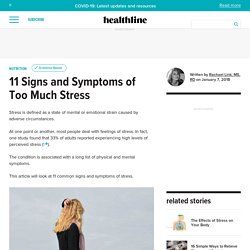
At one point or another, most people deal with feelings of stress. In fact, one study found that 33% of adults reported experiencing high levels of perceived stress (). The condition is associated with a long list of physical and mental symptoms. This article will look at 11 common signs and symptoms of stress. Acne is one of the most visible ways that stress often manifests itself. When some people are feeling stressed out, they tend to touch their faces more often. Several studies have also confirmed that acne may be associated with higher levels of stress. One study measured acne severity in 22 people before and during an exam. Another study of 94 teenagers found that higher stress levels were associated with worse acne, especially in boys (). These studies show an association, but don’t account for other factors that may be involved. Stress Effect: Understanding what you're dealing with.
Practise: Breathing Techniques to Reduce Stress. Coping with Parenting Stress. Many of us are working parents, right? © 2016 - 2020 Gwen Dewar, Ph.D., all rights reserved Parenting stress puts a strain on the whole family -- sapping patience, damaging relationships, eroding well-being.
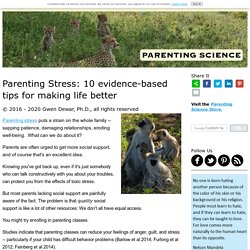
What can we do about it? Parents are often urged to get more social support, and of course that's an excellent idea. Knowing you've got back up, even if it's just somebody who can talk constructively with you about your troubles, can protect you from the effects of toxic stress. But most parents lacking social support are painfully aware of the fact. You might try enrolling in parenting classes. Studies indicate that parenting classes can reduce your feelings of anger, guilt, and stress -- particularly if your child has difficult behavior problems (Barlow et al 2014; Furlong et al 2012; Feinberg et al 2014).
However, the effects usually fade after the classes end -- suggesting that it's the ongoing social connections that matter. 1. The Proactive Approach: Identify and Avoid Stress Triggers Before They Happen. Family Stress: Dealing With It. During times of stress, our personal coping resources, and consequently our parenting skills, may need a boost — or a break.
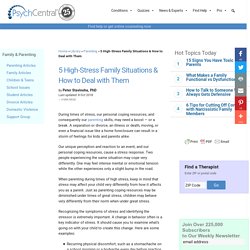
A separation or divorce, an illness or death, moving, or even a financial issue like a home foreclosure can result in a storm of feelings for kids and parents alike. Our unique perception and reaction to an event, and our personal coping resources, cause a stress response. Two people experiencing the same situation may cope very differently. One may feel intense mental or emotional tension while the other experiences only a slight bump in the road.
When parenting during times of high stress, keep in mind that stress may affect your child very differently from how it affects you as a parent. Recognizing the symptoms of stress and identifying the stressor is extremely important. It’s critical to remain vigilant to unfolding and developing stresses. Below are five types of stress situations and how to handle them: Divorce or separation. Related Articles May 17, 2016. Therapy Options for Stress. There are many healthy ways to relieve stress.
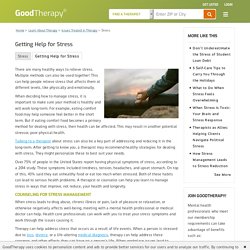
Multiple methods can also be used together! This can help people relieve stress that affects them at different levels, like physically and emotionally. When deciding how to manage stress, it is important to make sure your method is healthy and will work long-term. For example, eating comfort food may help someone feel better in the short term. But if eating comfort food becomes a primary method for dealing with stress, their health can be affected. Talking to a therapist about stress can also be a key part of addressing and reducing it in the long-term. Over 75% of people in the United States report having physical symptoms of stress, according to a 2014 study. Moving forward: If you choose therapy, here's what to expect. You have an appointment with a counselor for your first therapy session and you don't know what to expect.
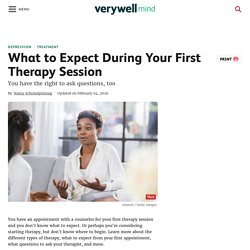
Or perhaps you're considering starting therapy, but don't know where to begin. Learn more about the different types of therapy, what to expect from your first appointment, what questions to ask your therapist, and more. How to Choose a Therapist What is your academic background, and what has your training been to prepare you to practice as a therapist? What specialized training and/or experience have you had in working with the issue I am dealing with?
First Things, First When you get to the therapist's office, expect your initial experience to be similar to a doctor's appointment. While waiting, you will likely fill out some paperwork, including: Insurance informationHIPPA formsTherapist-patient services agreementRecord release formYour medical history, including current medicationsA questionnaire about your symptoms Your First Meeting.